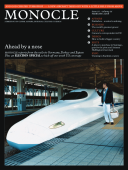
Issue 10
Ahead by a nose: Monocle reports from the rails in Germany, Turkey and Japan. Plus an election special to kick off our 2008 US coverage.
In This Issue
Oops! No content was found.
Looks like we no longer have content for the page you're on. Perhaps try a search?
Return Home

